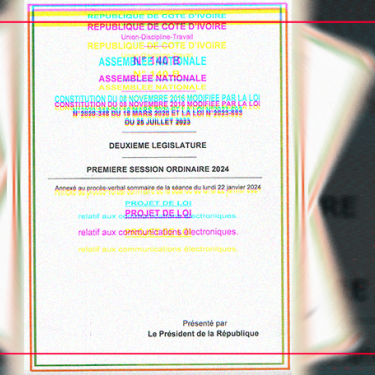RSF requests protection for journalists in Côte d'Ivoire’s electronic communications bill

Reporters Without Borders (RSF) calls for the withdrawal of a provision in an electronic communications bill in Côte d'Ivoire that would criminalise revealing the content of electronic messages, and could be used arbitrarily against journalists. If the article is not withdrawn, an exception should at least be made for journalists in order to safeguard their ability to work.
Côte d'Ivoire’s journalists, especially investigative reporters, are alarmed and irate about just two lines – paragraph 3 of article 214 – in the 82-page bill that a parliamentary commission approved on 14 March and is due to be submitted to a National Assembly plenary session on 18 April.
The paragraph in question says that “anyone who intercepts, discloses, publishes or uses the content of messages or reveals their existence” could be sentenced to five years in prison and a fine of 10 million CFA francs (around 15,245 euros).
Two parliamentarians, including Tiémoko Assalé, an independent who founded the investigative newspaper L’Éléphant Déchaîné, proposed amendments to the article that were designed to protect journalists, but without success.
In a statement issued on 15 March, the National Organisation of Investigative Journalists of Côte d'Ivoire (ONJI-CI) said the article could deter “journalists from pursuing certain investigations.” ONJI-CI president Seriba Koné called for the article’s withdrawal. “If an exception is included, it will remain subject to the interpretation of judges,” he said.
The bill’s adoption as it stands would be an alarming signal for Côte d’Ivoire’s journalists. Paragraph 3 of article 214 would open the way to abuse of authority and would contribute to the establishment of a climate of self-censorship for Ivorian journalists. We request this paragraph’s withdrawal or, at the very least, the addition of a clause making an exception for reporting that serves the public interest.
